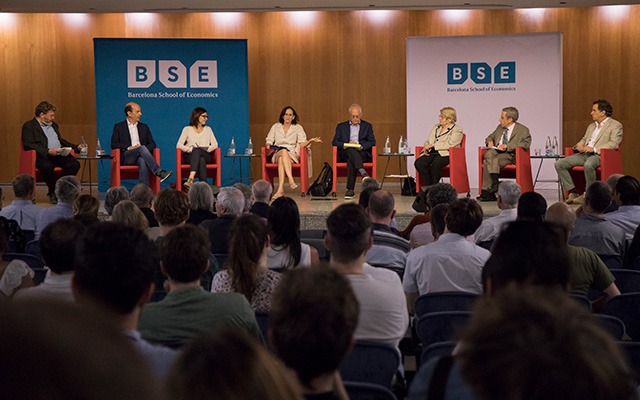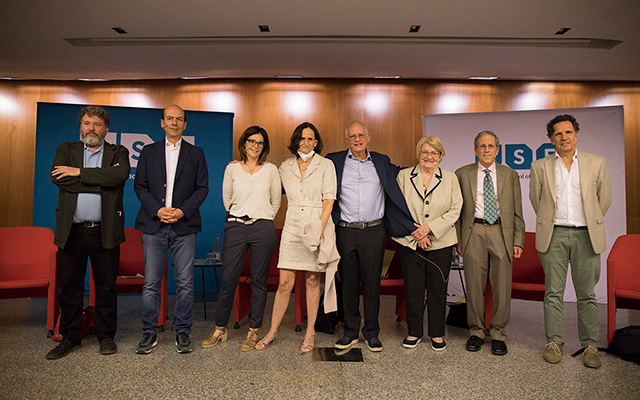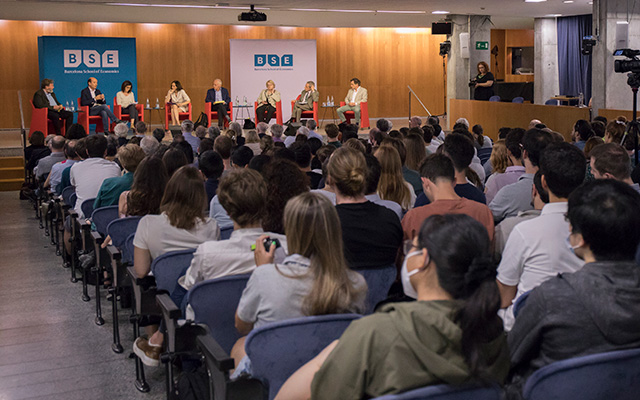community
Scientific Council Roundtable: “Present and future economic challenges: a BSE conversation”

Members of the BSE Scientific Council and faculty gathered to talk about burning challenges for the economy, including the prospects for globalization, growing inflation, inequality, climate change, and the role of policy makers and corporations in this taxing environment.
The Scientific Council of the Barcelona School of Economics is composed of leading academics, including 11 Nobel Laureates in Economics. Its role is to provide strategic guidance to the BSE, to help ensure the quality and performance of BSE research and academic programs, and to help create and strengthen the links between the BSE and the wider academic community.
The activity of the Scientific Council includes periodic meetings to analyze BSE education programs, research initiatives, and institutional development. This year's Scientific Council meeting was held on the 20th and 21st of May in Barcelona. In the context of this meeting, a group of Scientific Council members joined members of the BSE faculty in the roundtable, “Present and future economic challenges: a BSE conversation.”
Roundtable participants, from left to right: Jaume Ventura, Jordi Galí, Ada Ferrer-i-Carbonell, Raquel Fernández, Oliver Hart, Anne Krueger, Eric Maskin and Juan Pablo Nicolini.
Roundtable participants from the BSE Scientific Council:
- Raquel Fernández (NYU), moderator
- Oliver Hart (Harvard University, Nobel Laureate in Economics)
- Anne Krueger (The Johns Hopkins University)
- Eric Maskin (Harvard University, Nobel Laureate in Economics)
- Juan Pablo Nicolini (Federal Reserve Bank of Minneapolis)
Participants from the BSE faculty:
- Ada Ferrer-i-Carbonell (IAE-CSIC and BSE)
- Jordi Galí (CREI, UPF and BSE)
- Jaume Ventura (CREI, UPF and BSE)
Roundtable and ensuing dialogue
The roundtable featured a discussion of some key economic challenges of today, including the evolution of globalization, rising inequality and inflation, and the role of policy makers and corporations in facing these challenges. All of this against the backdrop of the COVID pandemic, the war in Ukraine, and the prospects of climate change.
The roundtable took place in the Auditorium of the Ciutadella Campus (UPF). The event was presented by BSE director, Teresa Garcia-Milà, after which the conversation was moderated by Raquel Fernández. Axes of the conversation included the state in which globalization is left after the onset of the COVID crisis and its effects, now aggravated by the war in Ukraine. Inflation and the rising inequality, and the key drivers of those problems were other topics addressed. On top of that, and in that context, what should be the objectives of policy makers and authorities? Could corporations be a part of the solution?
Video: Watch the full discussion on "Present and future economic challenges" with members of the Barcelona School of Economics Scientific Council and faculty.
Eric Maskin acknowledged that globalization has helped many low-income countries grow significantly, but he highlighted the dramatic increase in within-country inequality that has taken place over the last four decades. “While the inequality between developing and developed countries decreased, inside each country it has actually increased.” Even in countries having largely benefited from globalization, such as China and India, “a share of the population is left behind.” The causes of this, in his view, is that a substantial part of the population lacks the skills required to benefit from an integrated global economy. Globalization, he stated, “has resulted not only in an increase in trade, but also in a global increase in production. So, those with the right skills are higher in demand, but others are left behind.”
Anne Krueger agreed with Prof. Maskin, but she stressed that globalization has been very beneficial to the global economy. Although it is true that there has been a backlash against globalization, Krueger stated that it is largely driven by producers who benefit from a more protected economy. In her view, “an important problem is that the interests of producers are more quickly transmitted than those of consumers. They often seem to have the last word.” However, she was adamant that “countries willing to participate in trade will perform better than those which don’t.”
Jaume Ventura, in a thought-provoking claim, suggested that globalization perhaps “has not even started.” He added, “Europe has probably been the region that has had the most intense integration process in the last 27 years. Even in Europe, we are far from finding that borders do not matter anymore.” Moreover, he added, “previous crises have been times to build on a further integration. So a crisis of globalization may move forward the integration.”
Addressing some of the effects of inequality, Ada Ferrer-i-Carbonell pointed out that “individuals living in unequal societies tend to report lower satisfaction with their lives,” and that “while redistribution policies could alleviate this, they should not be a structural means to solve the problem. Seeking to boost equality of opportunities, such as by means of higher education, may be a better way to go.” Ferrer-i-Carbonell noted also that “wellbeing is much more linked to the unemployment rate in a country”, rather than to indicators of inequality such as the Gini index.
Roundtable participants also had the opportunity to answer questions from the public.
Another issue that featured prominently in the debate was the rise of inflation in advanced economies, which has recently risen to levels not seen since the 1980s. Jordi Galí considered that, in the absence of additional shocks to the global economy, ”in a medium term of 3-5 years… inflation will be returning to a more normal level and we will not see a repetition of the 60s and 70s crisis. The reason is that central banks are strongly committed to controlling inflation, and they have the tools to bring inflation down.” He did acknowledge, however, that the control of inflation could prompt a recession as “there is little that central banks can do to soften recessions. And, while governments can help, they will have their hands bound, as tax revenue will decrease.”
Juan Pablo Nicolini was asked about the relationship between the current rise of inflation in advanced economies and the Latin American experience with high inflation. In his view, Latin American inflationary history has been closely linked to lax fiscal discipline, and advanced economies would do well to keep their eye on fiscal sustainability. In his view, “the value of fiscal discipline is not something that a particular party should defend, but something that any government should defend.” Referring to the case of Argentina’s lackluster growth, he added, “consider the situation of having to live with half of what your parents had at your age. That is what irresponsible fiscal policy can do.”
Finally, how should corporations react to these challenges, especially since they are increasingly expected to be part of the solution by their customers and shareholders? On this topic, Oliver Hart agreed “they should act on behalf of shareholders, but that there are ways of doing so, other than just making shareholders wealthy.” In particular, corporations should maximize the welfare of shareholders, not necessarily their wealth. These two are not necessarily the same, he said, because “shareholders could consider the impact of corporate decisions, and the overall impact on the world." Moreover, given the large gaps left by existing legislation in important areas, Hart added that “companies may have some comparative advantage to act where governments are not able to.” This prompted a lively discussion and some objections among panel participants, which can be best summarized by Jordi Gali’s view that “leaving social problems to companies is a dangerous matter.”
Members of the BSE Scientific Council participating in the 2022 activities
- Aloisio Pessoa de Araujo (IMPA and Fundação Getulio Vargas, Rio de Janeiro)
- Orley Ashenfelter (Princeton University)
- Chong-en Bai (School of Economics and Management, Tsinghua University)
- Richard Blundell (University College London)
- Janet Currie (Princeton University)
- Mathias Dewatripoint (Université Libre de Bruxelles)
- Darrell Duffie (Stanford Graduate School of Business)
- Raquel Fernández (New York University)
- Oliver Hart (Harvard University, Nobel Laureate in Economics)
- Bengt Holmström (Massachusetts Institute of Technology, Nobel Laureate in Economics)
- Matthew Jackson (Stanford University)
- Tim Kehoe (University of Minnesota)
- Anne Krueger (The Johns Hopkins University)
- Justin Yifu Lin (National School of Development, Peking University)
- Charles F. Manski (Northwestern University)
- Eric Maskin (Harvard University, Nobel Laureate in Economics)
- Preston McAfee (Former Chief Economist, Microsoft)
- Juan Pablo Nicolini (Federal Reserve Bank of Minneapolis)
- John Roberts (Stanford University)
- Chris Sims (Princeton University, Nobel Laureate in Economics)
- Fabrizio Zilibotti (Yale University)
More about the BSE Scientific Council and the event:
Learn more about the BSE Scientific Council


